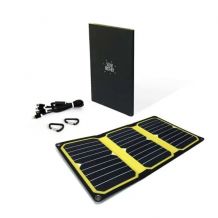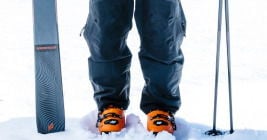Your choice of equipment can make all the difference when it comes to survival. That's why you need to prepare methodically, taking the following parameters into account: Versatility, weight, bulk and durability. It's up to you to make your list of products according to your requirements and practice. So you're ready to face any emergency in the mountains, and set off on your adventure with peace of mind!

Discover our top 10 survival products:
1 Backpack
To carry your gear, you'll need a good backpack, ergonomic and sturdy, with a volume adapted to what you plan to take with you. There is a wide range of backpacks to choose from, so your main criteria will be durability and strength. Carrying comfort is also a consideration if you're planning long expeditions.
2 Survival knife
A must-have in survival, a knife can help you in many situations. For chopping wood, preparing your meal and opening cans, opt for versatility without denigrating sturdiness. It should have a quality stainless steel blade and a comfortable handle. There are a multitude of survival knives available, with different blade shapes and constructions to suit different uses.
3 Filtering water bottle
Very useful for all your outings, a filtration system becomes indispensable for staying hydrated or cooking. In particular, it avoids the unpleasant bleach taste of purifying tablets. There are different types of filter: Straw, gourd, pump or gravity filters. Each type of filter is designed to meet a specific need, and each model has its own advantages and disadvantages, which should be taken into account when preparing your equipment.
4 First-aid kit
5 Compass
The compass is an indispensable tool for orientation in all circumstances. Even in the age of smartphones and GPS, if you run out of battery, it's your best ally. There are different types of compass: the compact or plate compass, which is easy to carry and use; the thumb compass, which is very ergonomic; and the sighting compass, for greater precision.
6 Survival blanket
The survival blanket is made of a waterproof, thermally insulating material designed to prevent hypothermia in an accident victim. It can be useful in many situations, as a signaling device with its reflective properties, a rain poncho or an improvised stretcher. It can also be used as a ground sheet at night to keep out the cold when bivouacking. There are two types of blanket: Non-reusable, economical, light but fragile. Reusable, thicker and therefore more durable, but a little heavier.
7 Appropriate clothing
Outdoors, you're entirely dependent on the weather. You'll need adapted clothing to anticipate weather changes and stay protected. Rain, snow, cold, heat and humidity are all elements to be taken into account when preparing for your adventures. So pack a rain poncho or waterproof jacket, technical thermal clothing against the cold or fleece, accessories (gloves, neck warmer) and breathable clothing for hot weather.
8 Headlamp
A headlamp or flashlight will be very useful for setting off in the early hours of the morning, or for getting organized and preparing for the night. You can choose between battery-powered and battery-powered, with more or less power. You'll still need a good autonomy or extra batteries.
9 Solar charger
Compact device for recharging cell phones and other devices. Practical, robust and environmentally friendly, these solar chargers can recharge batteries up to 48 volts and with a capacity of several hundred amps per hour. The only drawback: results will be less if there's little sunshine, so it's up to you to choose the type of solar panel best suited to the weather conditions at your destination or place of residence.
10 Tarp or hammock shelter
Even if in survival conditions you have the option of building a shelter, a hanging hammock or just a tarp can give you a minimum of comfort for a minimum of weight. The biggest advantage of a hammock is that it can be set up on any type of terrain (slope, type of soil), provided you have two attachment points. Remember to use strong, lightweight paracord to secure your hammock. A tarp will keep you dry if you need to sleep on the ground while traveling light.




.jpg)


















